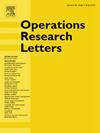具有不可用时段的锚定重新安排问题
IF 0.8
4区 管理学
Q4 OPERATIONS RESEARCH & MANAGEMENT SCIENCE
引用次数: 0
摘要
在一个稳健的两阶段调度问题的第一阶段决策中,给出了一组具有优先级限制的作业和一个基准调度。由于不可预知的干扰导致不可用时段,工作无法在某些时间间隔内执行,因此需要重新排程。具有不可用时段的锚定重新调度问题是要找到一个调度方案,最大限度地增加起始时间与基准调度方案接近的所谓锚定作业的数量。该问题可在多项式时间内求解。本文章由计算机程序翻译,如有差异,请以英文原文为准。
Anchored rescheduling problem with non-availability periods
A set of jobs with precedence constraints is given along with a baseline schedule, resulting from the first-stage decision of a robust two-stage scheduling problem. Non-availability periods caused by unpredicted disruptions prevent jobs from being executed on certain time intervals, thus requiring rescheduling. The anchored rescheduling problem with non-availability periods is to find a schedule maximizing the number of so-called anchored jobs whose starting times remain close to the baseline schedule. It is shown to be solvable in polynomial time.
求助全文
通过发布文献求助,成功后即可免费获取论文全文。
去求助
来源期刊

Operations Research Letters
管理科学-运筹学与管理科学
CiteScore
2.10
自引率
9.10%
发文量
111
审稿时长
83 days
期刊介绍:
Operations Research Letters is committed to the rapid review and fast publication of short articles on all aspects of operations research and analytics. Apart from a limitation to eight journal pages, quality, originality, relevance and clarity are the only criteria for selecting the papers to be published. ORL covers the broad field of optimization, stochastic models and game theory. Specific areas of interest include networks, routing, location, queueing, scheduling, inventory, reliability, and financial engineering. We wish to explore interfaces with other fields such as life sciences and health care, artificial intelligence and machine learning, energy distribution, and computational social sciences and humanities. Our traditional strength is in methodology, including theory, modelling, algorithms and computational studies. We also welcome novel applications and concise literature reviews.
 求助内容:
求助内容: 应助结果提醒方式:
应助结果提醒方式:


